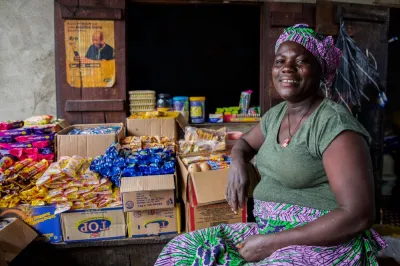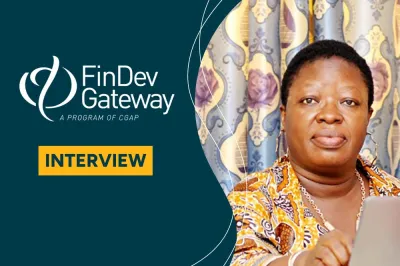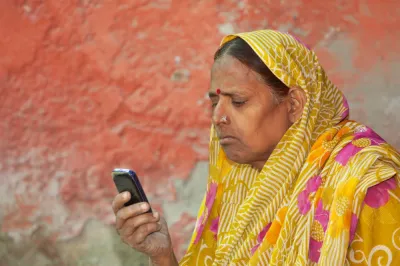FinDev COVID-19 Update | 19 Nov - 02 Dec 2020
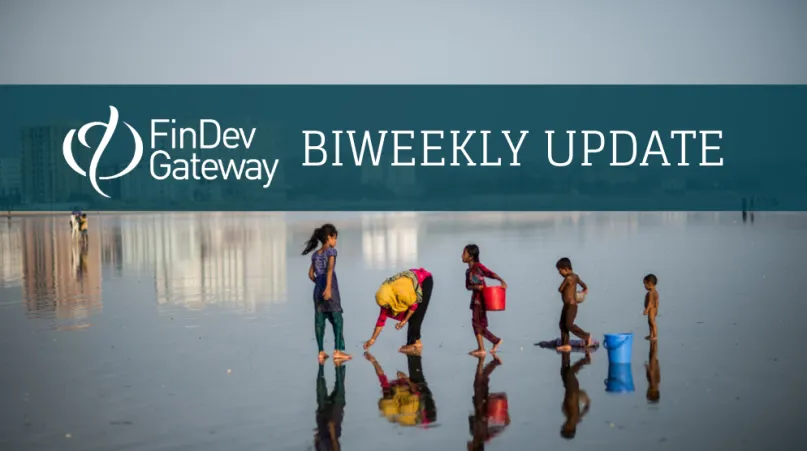
FinDev Gateway has created this COVID-19 Update with the latest and most relevant knowledge resources for financial inclusion. Sign up to receive this update to your inbox.
If you have content to share in our COVID-19 update, please submit here or contact us directly.
Do you find the FinDev Update useful? Take a moment to let us know >>
Global Update
- A new IMF paper finds that the spread of infectious disease lowers demand for physical cash.
- FinEquity’s annual event highlighted, among others, the importance of data analytics to advance women’s resilience through financial inclusion.
- UN Women says governments need to ensure access to essential services, such as health, police, justice and social services for over 66 million women migrant workers who face additional risks due to the pandemic.
- An analysis of data from World Bank’s high frequency monitoring phone surveys shows that in most countries, social assistance interventions in the early months of the pandemic were highly inadequate and not well-targeted to those who are affected by the crisis. On average, only 20 percent of households reported receiving assistance across countries included in the analysis. Looking more broadly at social assistance programs, a J-Pal blog author suggests that such programs are often under-subscribed for various reasons including lack of IDs, lack of information, behavioral bias, and cost.
Asia
- Myanmar’s second wave of COVID-19 is causing a worrying increase in poverty, according to recent results from a high-frequency phone survey conducted by IFPRI. The organization’s research suggests that lockdowns must be accompanied by larger and better targeted cash transfers in order to mitigate the economic impacts of the pandemic.
- Recent CGAP research shows how informal e-commerce can help women in Pakistan be more resilient to the economic effects of COVID-19.
- In Nepal, the lack of local employment opportunities has led Nepali migrant workers who had returned from India due to the pandemic to go back to India again in recent months to seek work. Nepali migrants who were working in other countries are still returning, and ILO expects around 500,000 workers to come back to Nepal from other countries besides India.
- Remittances to the Philippines in September were 9.3 percent higher than the previous year, despite the return of 300,000 migrant workers who lost their jobs abroad due to the pandemic. Similarly, in Nepal, remittances have increased by 12.5 percent, contrary to the projected decline due to COVID-19.
Africa
- In Kenya, several large commercial banks have cut the amount of credit provided through mobile phones. Bank officials believe that the measures taken by the Central Bank of Kenya to support small businesses and households during the COVID-19 crisis, in particular the suspension of the publication of defaulting debtors, has led to an increase in delinquency rates. In the meantime, the number of registered mobile money accounts hit a record high in October.
- Togo’s cash transfer program Novissi, which targets informal workers affected by the pandemic, has been successful in deploying digital services and is being emulated in many African countries. However, limited internet access remains a big obstacle in Togo, where the penetration rate of mobile broadband is 20 percent, while 3G and 4G cover only 10 percent of the population.
- According to an IFC study, 81 percent of MSMEs in Sierra Leone reported a decrease in profit since the onset of the pandemic, and 71 percent have ongoing cash flow issues.
- Three phone surveys conducted in Mauritius from May through July revealed that about one in three households kept losing income after the lockdown measures were lifted. To cope with the shocks, households were reducing food consumption (39.7 percent in July) and relying on savings (13.1 percent in July).
For more on Africa, check out the latest Portail FinDev Biweekly Update in French.
Latin America and the Caribbean
Most articles and knowledge resources referenced in this section are in Spanish.
- MiLAB, a public sector innovation lab in Colombia, and the government program Banca de las Oportunidades launched a call for proposals for tech solutions targeting financially excluded low-income Colombians and MSMEs which have been most affected by the pandemic. The 10 best proposals will receive technical support and four of them will obtain financing for implementation.
- Brazil’s instant payment system, PIX, has been finally launched and now allows consumers, the private sector and government entities to send and receive money without using debit or credit cards. Banco do Brazil is the first bank that allows the use of PIX payments through WhatsApp. Facebook’s WhatsApp digital payment services were launched in Brazil last June but suspended by the Central Bank shortly after.
- In Argentina, traditional banks are responding quickly to fintech competition and the digital wave propelled by COVID-19. The digital bank platform MODO, created by a consortium of more than 30 banks, will be launched this Thursday. The platform will enable users to manage all of their financial accounts in one place, and perform transactions such as checking cash balances, sending money to WhatsApp contacts, and making QR payments.
For more on LAC, check out the latest Portal FinDev Biweekly Update in Spanish.
Arab World
Some articles and knowledge resources referenced in this section are in French.
- Bank Al-Maghrib, the central bank of Morocco, established a guarantee fund that will benefit microcredit associations by covering the restructured and additional credit granted in response to COVID-19.
- A new $30 million investment by the SANAD Fund aims to boost Banque du Caire’s growth plans and provide liquidity to Egyptian MSMEs, agricultural producers and MFIs that have suffered from the pandemic.
- According to a recent report by the International Rescue Committee, refugees in Jordan and other host countries have been forced to cut back on meals because of sudden loss of income due to the pandemic. Refugees struggle to navigate the complex and restrictive regulatory environment in trying to access financial services; they are 50 percent less likely to have an internet-enabled phone than the general population.
- Following strong growth in the e-payment sector driven by the COVID-19 pandemic, Egyptian mobile operator Etisalat Misr wants to attract 20 million customers to its "Etisalat Cash" money transfer and exchange services. The operator plans to invest around $320 million in the Egyptian market in 2021 to support the state’s plans to achieve financial inclusion.
- The Central Bank of the UAE launched a FinTech Office that will work on developing a mature financial technology ecosystem within the country. The new office aims to position the nation as a leading fintech hub by supporting digital payments and financial inclusion. The number of fintech startups in the MENA region has grown significantly in 2020 and are expected to double the amount of capital raised by the end of the year to $200 million.
For more on the Arab world and resources in Arabic, check out the latest FinDev Update in Arabic.
COVID-19 Resources
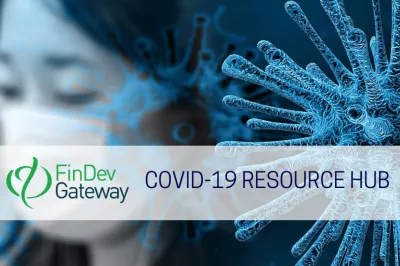
COVID-19 Resource Hub
A collective space for the financial inclusion community to share experiences and lessons learned from the pandemic
FinDev Coronavirus Data Tracker
Data relevant for financial inclusion - find out who is tracking what
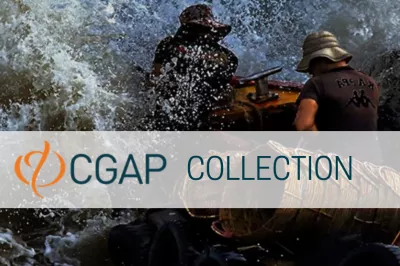
Blogs & Opinion
If you have a blog idea and would like to write for the FinDev Blog, please review our guidelines. We do not cross-post blogs that have been published elsewhere, but if you wish to share an existing blog post in our next FinDev COVID-19 Update, you can send it to us using our contact form.
Digital Finance
COVID-19 Is Accelerating Digital Banking Across the Globe: Here’s How It Will Impact Bangladesh
01 Dec 2020 | Jakirul Islam | NextBillion
COVID-19 Testing Resilience of Informal E-Commerce in Pakistan
01 Dec 2020 | Zuneera Shah | CGAP
Digital Transformation at the Service of Clients: Our Keys to Success
30 Nov 2020 | Dagoberto Danton Cereceda González | Boulder Institute of Microfinance
Overcoming Under-Subscription of Welfare Programs: Digital Solutions to Low Take-up
24 Nov 2020 | Aimee Hare | J-PAL
2020 SEEP Conference: What I Learnt About Digital Savings Groups
19 Nov 2020 | Diana Dezso | SEEP Network
Fintech
Salary Advances Are Helping Gig Workers In India Make Essential Purchases During COVID-19
02 Dec 2020 | Malika Anand, Rohit Rathi & Badal Malick | BFA Global
How Can Fintech Innovation Drive Inclusive Growth?
Forces and Uncertainties Shaping Future Fintech Ecosystems
Fintech Forests: Classifying and Comparing Fintech Ecosystems
How Domestic Fintech Ecosystems Shape The Nature of Innovation
19-27 Nov 2020 | David Porteous & Arend Kulenkampff | BFA Global
Gender and Women’s Financial Inclusion
Crisis as an Inflection Point for Women’s Financial Inclusion
29 Nov 2020 | Diana Dezso | FinEquity
Opportunity in Every Crisis
24 Nov 2020 | Dr. Alfred Hannig | Alliance for Financial Inclusion
Remittances
What Impact Does Social Distancing Have on Global Remittances?
20 Nov 2020 | Shailey Tucker & Seka Parfait | MicroSave Consulting
How Is the Pandemic Affecting Remittances to Fragile and Conflict Affected Settings?
20 Nov 2020 | Franck Bousquet, Dilip Ratha & Michal Rutkowski | World Bank
Rural and Agricultural Finance
Challenges Of Financial Inclusion For Small Producers And Low-income Rural Families – Covid 19
23 Nov 2020 | Oscar Guzmán | Boulder Institute of Microfinance
Socioeconomic Impact
Impact of COVID-19 on Households: What Do Phone Surveys Tell Us?
20 Nov 2020 | Carolina Sánchez-Páramo & Ambar Narayan | World Bank
Recent Publications
Do you have a publication to add to this list? Share your work on FinDev Gateway.
COVID-19 and Refugees' Economic Opportunities, Financial Services and Digital Inclusion
International Rescue Committee | Nov 2020
Weathering the Storm II: A Case Study of Spandana
Center for Financial Inclusion at Accion | Nov 2020
Impact of the COVID-19 Pandemic on MSMEs
MicroSave (MSC) | Nov 2020
Navigating Through COVID-19: A Snapshot on How the Pandemic Affected MSMEs in Guinea
International Finance Corporation (IFC) | Nov 2020
Navigating Through COVID-19: A Snapshot on How the Pandemic Affected MSMEs in Sierra Leone
International Finance Corporation (IFC) | Nov 2020
Addressing the Impacts of the COVID-19 Pandemic on Women Migrant Workers
UN Women | Nov 2020
View All Publications Related to COVID-19 >
Webinar Recordings
Microfinance and the Poor in Times of Crisis
30 Nov | CGAP
What Is the Future of Microfinance?
20 Oct | FinDev Gateway
View All Upcoming Events Related to COVID-19 >
News
AFD Loans $356M to IFAD to Assist Rural Farmers
| MicroCapital | Global
Kenya’s Mobile Money Use Hits Record High in October Amid COVID-19 Pandemic
| Africa CGTN | Kenya
View All News Related to COVID-19 >
Quick Links:
FinDev Guide
About this guide
Published
Topics
Contributed by a global financial inclusion community member. Share your lessons learned
Write for usLeave a Comment
Comments on this page are moderated by FinDev Editors. We welcome comments that offer remarks and insights that are relevant to the post. Learn More
